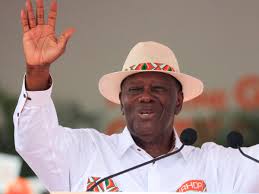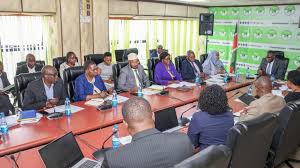Ivory Coast’s President Alassane Ouattara has secured a fourth presidential term after winning the country’s election by a large margin, according to official results announced on Monday, October 27, 2025.
Ouattara, 83, won the election held on October 25, 2025, with an overwhelming majority, defeating his main rivals in a poll marked by low voter turnout and scattered opposition protests.
The election took place amid calls from opposition parties and civil rights groups urging the long-serving leader to retire after nearly 15 years in power.
However, the ruling party, Rally of Houphouëtists for Democracy and Peace (RHDP), maintained that Ouattara’s candidacy was constitutional following the adoption of a new national charter in 2020, which reset presidential term limits.
President Ouattara cast his vote at Lycée Sainte-Marie de Cocody in Abidjan, where he was accompanied by his wife, Dominique Ouattara, and greeted by cheering supporters.
Speaking to the media after voting, Ouattara promised to “continue working for peace, development, and unity among Ivorians.”
According to the Independent Electoral Commission, Ouattara received over 70 percent of the vote, while opposition candidates trailed far behind. Opposition leaders have alleged irregularities in the voting process, claiming that some of their polling agents were denied access to certain stations.
International observers from the African Union (AU) and ECOWAS reported that the election was largely peaceful, though they noted concerns about voter apathy and the need for greater transparency in future elections.
Supporters in Abidjan’s city center celebrated Ouattara’s victory with street dances, music, and fireworks late into the night. However, small groups of protesters in the opposition strongholds of Bouaké and Yamoussoukro demanded fresh elections, saying the process lacked fairness.
Political analysts say Ouattara’s win strengthens his grip on power but also raises questions about democratic transition in Ivory Coast, one of West Africa’s largest economies.
His fourth term makes him one of the longest-serving leaders in Africa, alongside Cameroon’s Paul Biya and Uganda’s Yoweri Museveni.
Since taking office in 2011, Ouattara has been credited with reviving Ivory Coast’s economy, rebuilding infrastructure, and attracting foreign investment after years of civil conflict.
However, critics accuse him of tightening political control, suppressing dissent, and failing to reconcile divisions that persist since the post-election violence of 2010–2011.
Ouattara’s new term will run until 2030, and he has promised to focus on youth employment, industrialization, and maintaining national stability.
Ivory Coast’s President Alassane Ouattara has won a fourth term in office after a decisive victory in the October 25 elections.
While supporters celebrate his continued leadership, critics argue that the extended rule threatens the country’s democratic progress.



